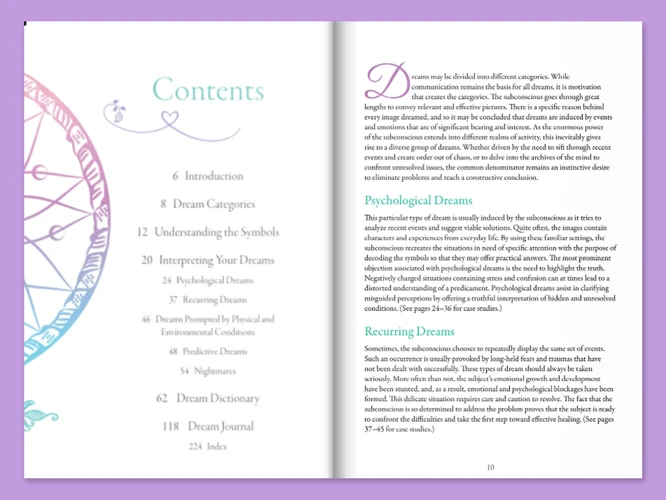Introduction

Dreams have fascinated humans for centuries, but their meaning and purpose remain a mystery. Many people believe that dreams contain hidden messages or symbols that can reveal important aspects of our inner selves. To unlock the secrets of our dreams, we must first learn how to interpret them with the help of a dream journal. In this article, we will explore the steps you can take to keep an effective dream journal and interpret your dreams, helping you gain a deeper understanding of your subconscious mind. So, grab a pen and paper, and let’s dive into the perplexing world of dreaming.
What is a Dream?
A dream is a series of thoughts, images, and sensations that occur in a person’s mind during sleep. It is a complex and mysterious experience that has fascinated humans for centuries. From a scientific perspective, dreams are believed to be related to the functioning of the brain during sleep. They are influenced by various factors such as emotions, experiences, and memories. Dreams can range from realistic and vivid to abstract and surreal.
Table: The Science of Dreams
| Aspect of Dreaming | Description |
| — | — |
| Brain activity | Studies show that certain areas of the brain are more active during dreaming than during waking consciousness. |
| Sleep cycle | Dreams occur during the Rapid Eye Movement (REM) stage of sleep, which typically happens 90 minutes after falling asleep. |
| Emotions | Dreams are heavily influenced by emotions, with negative emotions more common than positive ones. |
| Memory | Dreams may play a role in memory consolidation, helping to process and remember information. |
| Creativity | Dreams have been a source of inspiration for artists, writers, and inventors throughout history. |
Dreams are a fascinating and enigmatic phenomenon that offer a glimpse into the workings of the mind. By keeping track of our dreams and delving into their meanings, we can gain a deeper understanding of ourselves and the worlds we inhabit.
Why Keep a Dream Journal?
Keeping a dream journal can serve many purposes for individuals interested in exploring their dreams. Here are some reasons why you may want to consider starting one:
| Reason | Description |
| Memory Retention | Recording your dreams upon waking can help you remember them with more clarity. By keeping a dream journal consistently, you can train your brain to retain and recall details from your dreams better over time. |
| Self-Discovery | Self-exploration can be achieved through analyzing your dreams. By recording your dreams, you can identify patterns, recurring themes, and unconscious thoughts and feelings that may not be consciously acknowledged. This self-awareness can foster personal growth and development. |
| Problem-Solving | Some people believe that dreams can offer insights and solutions to problems they are facing in waking life. By keeping a dream journal and analyzing the symbolism and messages in your dreams, you may gain new perspectives that can help you make decisions and find solutions to real-life issues. |
| Improved Creativity | Some studies have suggested that recording your dreams and analyzing them can lead to an increase in creative thinking and problem-solving skills. Exploring the strange and fantastical world of your dreams can provide inspiration and spark new ideas for creative projects in your waking life. |
Keeping a dream journal can offer many benefits for individuals interested in exploring their inner selves, processing emotions, and improving mental function. Whether you are a seasoned dream explorer or new to the practice, starting a dream journal can be an excellent first step towards unlocking the mysteries of your subconscious mind.
The Benefits of Interpreting Your Dreams
Interpreting your dreams can have many benefits that go beyond simply understanding the content of your dreams. Here are a few reasons why interpreting your dreams can be a worthwhile pursuit:
- Gain self-awareness: Dreams can reveal deep insights into your thoughts, feelings, and desires. By interpreting your dreams, you may be able to gain a better understanding of your subconscious mind and your true self.
- Healing: Dreams can also help you work through emotional issues and traumas. By interpreting the symbolism and emotions in your dreams, you can gain insight into the root of the problem and begin the healing process.
- Creativity: Dreams are often filled with vivid imagery and creative ideas. By interpreting your dreams, you can tap into this creativity and use it to inspire your art, writing, or other creative pursuits.
- Problem-solving: Dreams can provide solutions to problems or challenges that you may be facing in your waking life. By interpreting the symbolism and messages in your dreams, you may be able to find answers to difficult questions or challenges.
- Personal growth: Interpreting your dreams can help you grow as a person by providing insights into your personality, strengths, and weaknesses. By becoming more self-aware, you can make positive changes in your life that lead to personal growth and development.
As you can see, the benefits of interpreting your dreams are wide-ranging and significant. By keeping a dream journal and working with your dreams, you may be able to unlock deeper insights into yourself and your life.
Keeping Your Dream Journal

One of the most crucial components of unlocking the mysteries of your dreams is keeping a record of them. Your dream journal will serve as a valuable tool in analyzing and interpreting the messages and symbolism that your subconscious sends you while you sleep. But with all the different types of journals out there, how do you know which one is right for you? And once you have chosen the perfect journal, how can you ensure that you accurately record every detail of your dreams? In this section, we will explore the best ways to keep your dream journal and get the most out of recording your dreams.
Choosing the Right Journal
When it comes to keeping a dream journal, choosing the right journal is an important first step. Here are some factors to consider when selecting a journal:
- Size: Choose a size that is comfortable for you to write in. Some people prefer a smaller notebook that they can easily carry with them, while others prefer a larger notebook for more space to write and draw.
- Binding: Consider the binding of the journal as well. A spiral binding allows for easy flipping of pages, while a hardcover binding provides more durability and protection for your entries.
- Design: The design of the journal can also play a role in your enjoyment and motivation to write in it. Some people prefer a simple and minimalist design, while others may prefer a more artistic or personalized journal.
- Paper Quality: It’s important to choose a journal with good quality paper that won’t smudge or bleed through with your writing and any art you may include. Look for a thicker paper with a smooth surface.
- Accessibility: Consider how accessible the journal will be for you to write in regularly. Will it be easy for you to find and access it each morning or after each dream? Choose a location and storage option that will make it easier for you to remember to write in it.
By taking the time to choose the right journal for your needs and preferences, you can make your dreaming and journaling experience more enjoyable and productive.
Recording Your Dreams
To record your dreams effectively, it is important to have a consistent format for your dream journal entries. This will make it easier to identify patterns and recurring themes in your dreams. Here is an example of a helpful format:
| Date: | Month/Day/Year |
| Time: | Estimated Time of Dream |
| Location: | Where you went to bed and where you woke up |
| Emotions: | How you felt during the dream and upon waking |
| Characters: | Any people or animals (real or imagined) who appeared in the dream |
| Events: | What happened in the dream, in sequence. Try to remember as much detail as possible |
| Symbols: | Any objects, colors, or other symbols that appeared in the dream |
| Comments/Reflections: | Your thoughts and feelings about the dream after waking up. Also note if anything from the dream feels particularly significant or if it reminds you of something in your waking life. |
By using this format or something similar, you will be able to record your dreams clearly and thoroughly. It may be helpful to keep your dream journal near your bed so you can write down your dream as soon as you wake up. Don’t worry if you can’t remember every detail – just jot down what you can recall and add more details later if they come to you.
Organizing Your Dreams
Once you’ve recorded your dreams in your journal, it’s essential to organize them in a way that makes it easy for you to access and analyze them. Here are some useful tips for organizing your dreams:
- Create categories: Start by creating categories for different types of dreams, such as recurring dreams or nightmares. This will make it easier to compare and analyze similar dreams together.
- Use tags: Use tags to assign keywords to your dreams. For example, you can use a tag for emotions such as “fear” or “joy,” or themes such as “flying” or “water.” This will help you quickly locate specific dreams that contain a particular symbol or emotion.
- Date and title: Always date and title your dreams. This will help you keep track of the order in which you’ve had them, and the title can serve as a helpful reminder of the dream’s theme or content.
- Summarize: After recording each dream, summarize the main themes, symbols, and emotions you experienced. This summary will help you revisit the dream quickly and remember its essence.
- Color-code: Use different colors to highlight specific dream elements such as people, places, and things. This technique can help you identify patterns and symbolism more quickly, especially when you’re flipping through your journal.
By organizing your dreams, you’ll be able to identify recurring patterns and symbols, gain insight into your subconscious mind, and track your progress as you continue to interpret your dreams.
Interpreting Your Dreams

As you delve deeper into your dream journal, you may find yourself lost in a maze of symbols and meanings. Deciphering the messages hidden within your dreams can be a perplexing task, but with the right tools and techniques, you can unlock the mysteries of your subconscious mind. In this section, we will explore some of the key strategies for interpreting your dreams, including identifying patterns, exploring symbolism, and examining your emotions. By honing your skills in dream interpretation, you can discover the insights and reflections that your dreams hold, and gain a greater understanding of your inner self.
Identifying Patterns
When interpreting your dreams with the help of your dream journal, it’s crucial to identify any patterns that may emerge. Here are some key steps to follow when identifying patterns:
- Read through your dream journal: It’s important to take the time to read through your dream journal and identify any recurring themes or images that appear in multiple dreams.
- Look for common emotions: Pay attention to any strong emotions that you experience in your dreams, such as fear, anxiety, or excitement. Do these emotions occur in similar situations or with the same people?
- Take note of any recurring symbols: Many dreams contain symbols that may represent something important in your life. For example, dreaming of water could represent your emotional state or subconscious mind.
- Consider the time of day: Do you have more vivid dreams at certain times of the day or night? Do you notice any patterns in your dreams based on your sleep schedule?
By identifying patterns in your dreams, you can gain a deeper understanding of your subconscious mind and the messages it may be trying to communicate to you. It’s important to approach this process with an open mind and a willingness to explore the deeper meanings behind your dreams.
Exploring Symbolism
When interpreting your dreams, it’s important to explore the symbolism that appears. Dreams often utilize symbolism to convey complex and abstract ideas or emotions. Symbolism is personal and can differ from person to person, so it’s crucial to consider what the symbol means to you. Here are some ways to explore the symbolism in your dreams:
| Step 1: Identify Symbols | Step 2: Consider Context | Step 3: Reflect on Personal Meaning |
|---|---|---|
| Start by making a list of symbols that appear in your dreams. Symbols can include objects, people, animals, or even colors. | Consider the context in which the symbol appears. Is it positive or negative? What is happening in the dream when the symbol appears? | Reflect on what the symbol means to you personally. What emotions or memories does it evoke? |
| Example: A snake appears in your dream. | Example: The snake appears when you’re lost in the forest. | Example: Snakes remind you of a childhood fear. |
| Example: A rabbit appears in your dream. | Example: The rabbit appears when you’re running through a meadow. | Example: Rabbits remind you of your pet rabbit from childhood. |
Exploring symbolism in your dreams can reveal hidden emotions, conflicts, or desires that may be affecting your waking life. By paying attention to the symbols in your dreams, you can gain insight into your subconscious and learn more about yourself.
Examining Emotions
Examining emotions is a crucial step in interpreting your dreams. Our dreams are often connected to our subconscious and exploring the emotions tied to our dreams can help us uncover deeper meanings.
One technique for examining emotions in your dreams is to create an emotion table. This table will help you track the emotions you experience in your dreams and identify any patterns or trends.
| Emotion | Description | Frequency |
|---|---|---|
| Fear | Feeling of being scared or anxious. | High |
| Joy | Happiness or positive feelings. | Low |
| Sadness | Feeling of being upset or blue. | Medium |
In this example, the dreamer experiences high levels of fear in their dreams and medium levels of sadness. This could indicate that the dreamer is currently experiencing anxiety or stress in their waking life. Identifying these patterns can help the dreamer understand their emotions and potential sources of stress.
Another technique is to examine the emotions tied to specific symbols in your dreams. For example, if you dream of a snake, how do you feel in the dream? Do you feel scared or intrigued? These emotions can provide additional insights into the meaning behind the symbol.
By examining the emotions in your dreams, you can gain a deeper understanding of your subconscious and uncover messages from your inner self. It may take time and practice, but the benefits of exploring your emotions in your dreams can be life-changing.
Putting it all Together
As you delve deeper into the world of dream interpretation, you may start to feel overwhelmed and unsure of how to make sense of it all. However, fear not! With the information you have gathered from recording and analyzing your dreams, you are now ready to take the final step to unlocking the mysteries of your subconscious mind. It’s time to tie everything together and put your newfound knowledge into practice. Let’s explore some tips for tracking your progress and sharing your dreams with others.
Tracking Your Progress
As you continue to keep your dream journal and interpret your dreams, it can be helpful to track your progress over time. By doing so, you can see how your dreams and interpretations have evolved, gain insight into recurring themes or patterns, and identify areas in which you may want to focus your personal growth and development.
One way to track your progress is to create a table in your dream journal. Using distinctive columns, you can record the date of the dream, the theme or subject of the dream, any significant symbols or emotions that stood out, and any insights or interpretations you gained. Here is an example:
| Date | Theme/Subject | Symbolism/Emotions | Insights/Interpretations |
|---|---|---|---|
| 10/1/2021 | Nightmare about being chased | Feeling of fear and panic, dark figure chasing me | Realized that I am avoiding confronting a difficult situation in waking life; need to take action to face my fears |
| 10/3/2021 | Visit from deceased loved one | Feeling of comfort and peace, bright light, deceased loved one holding my hand | Believe that this dream was a message from my loved one that they are always with me and watching over me; feeling more at peace after the dream |
| 10/6/2021 | Flying dream | Feeling of freedom and joy, soaring over mountains and forests | Interpreted this dream as a sign of personal growth and empowerment, feeling more confident and capable in waking life as a result |
By creating a table like this, you can easily see how your dreams and interpretations are progressing over time, and identify any themes or patterns that may be emerging. You can also use this information to create specific goals or intentions for your dream practice, such as focusing on certain themes or symbols in your dreams, or working on understanding and processing certain emotions that arise.
Tracking your progress through a dream journal table can be a valuable tool for gaining insight into your subconscious mind and achieving personal growth and development.
Sharing Your Dreams
Sharing your dreams with others can be a great way to gain further insight and perspective on their possible meanings. Here are some ways to share your dreams:
- Join a dream group: Look for local dream groups or online communities where members share and discuss their dreams. This can provide a safe and supportive space to explore the symbols and themes in your dreams.
- Talk to a therapist: If you are struggling with recurring nightmares or emotionally charged dreams, consider seeking the help of a professional therapist. They can provide guidance on interpreting your dreams and offer strategies for managing any underlying issues that may be contributing to your dreams.
- Share with a trusted friend or partner: Talking through your dreams with someone you trust can help you gain new insights and perspectives. Plus, it can be a fun and engaging way to deepen your relationship with them.
- Write a dream story: Use your dreams as inspiration for creative writing. You can craft a short story or poem based on the themes and symbols in your dream. This can help you deepen your understanding of your dream and may even provide new insights.
- Keep a dream diary for couples: If you are in a romantic relationship, start a dream diary with your partner. Each morning, take a few minutes to share your dreams from the night before. This can help strengthen your emotional bond and provide a deeper understanding of each other’s inner worlds.
Remember, when sharing your dreams, it’s important to find a safe and supportive space where you feel comfortable being vulnerable. While others may offer insights and interpretations, ultimately it is up to you to decide what your dream means to you.
Conclusion
After learning about the benefits of interpreting your dreams and how to keep a dream journal, you are now equipped with the tools to unlock the mysteries of your subconscious mind. Your dream journal is a powerful tool that can help you tap into your innermost thoughts, desires, and fears.
By recording your dreams and reflecting on their meanings, you can gain valuable insights into your psyche and better understand yourself as a person. You may find that certain patterns emerge in your dreams, or that certain symbols hold particular significance.
Exploring these patterns and symbols can help you uncover subconscious emotions or desires that you may not have been aware of before. By understanding these hidden aspects of yourself, you can work towards personal growth and self-improvement.
It is important to remember that dream interpretation is not an exact science, and the meanings of your dreams can vary depending on your own unique experiences and perspectives. However, by putting in the effort to record your dreams and reflect on their possible meanings, you can gain valuable insights into your own psyche and unlock the full potential of your subconscious mind.
So grab a journal, start recording your dreams, and get ready to embark on a journey of self-discovery and personal growth. Your dreams may hold the key to unlocking the mysteries of your mind and helping you become the best version of yourself.
Frequently Asked Questions
How often should I record my dreams in my dream journal?
You should record your dreams in your journal as soon as you wake up, while the details are still fresh in your mind. Try to write down your dreams every morning.
What should I do if I can’t remember my dream?
Even if you can’t remember your whole dream, try to write down any fragments or emotions you can recall. Over time, the act of recording your dreams will train your brain to remember more of them.
Do I need to interpret every single dream?
No, not every dream will have a significant meaning. However, interpreting your dreams can help you gain greater insight into your subconscious mind and improve your overall well-being.
Can dream symbolism have different meanings for different people?
Yes, just like words can have different meanings for different people, dream symbols can also vary in interpretation. It’s important to consider your personal associations and experiences when interpreting the symbols in your dreams.
What should I do if I have a nightmare?
Don’t ignore or suppress your nightmares. Instead, try to confront and interpret them to understand any underlying fears or anxieties. This can help you resolve any subconscious issues and eliminate future nightmares.
Can lucid dreaming be helpful in interpreting my dreams?
Yes, lucid dreaming can be a useful tool in interpreting your dreams because it allows you to consciously interact with and manipulate dream elements. This can help you gain a deeper understanding of your subconscious mind.
Is it possible to have recurring dreams?
Yes, it’s common to have recurring dreams or dream themes. These can be indicators of deeper issues that need to be addressed or simply reflect a repeating pattern in your life.
Can physical sensations in my dreams have meaning?
Yes, physical sensations in your dreams can be meaningful and may represent emotions or experiences in your waking life.
Should I share my dreams with others?
Sharing your dreams with trusted individuals can help you gain insight and perspective on the symbolism and themes present in your dreams. However, be mindful of who you share with and make sure they are supportive and non-judgmental.
Can analyzing my dreams lead to better mental health?
Yes, analyzing your dreams can help you gain a greater understanding of your subconscious mind and address any underlying psychological issues. This can lead to improved mental health and overall well-being.








